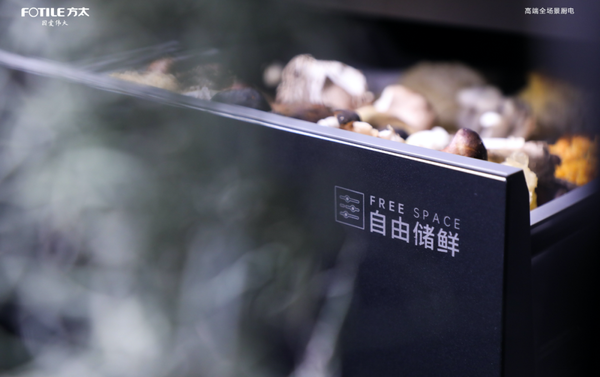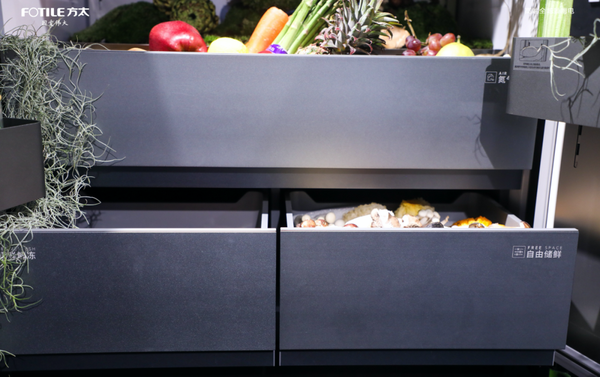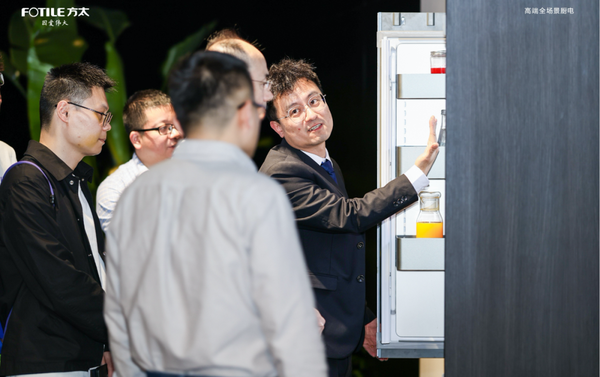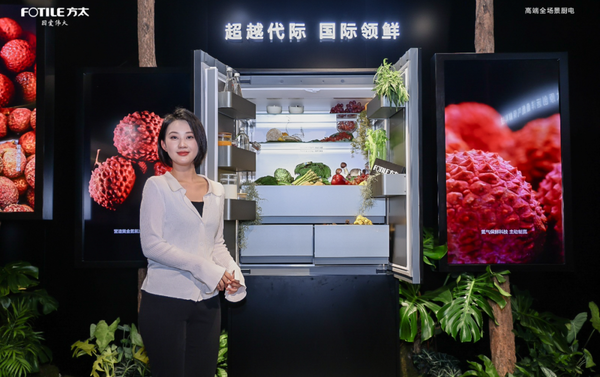From "Quality and Freshness Preservation" to "Nutritional Management," Fotile Innovatively Introduces a New Track in Refrigerator Technology Competition.
At the 2025 AWE (China Household Appliances and Consumer Electronics Expo), known as the "Oscar of Home Appliances," the world's top home appliance exhibition has just concluded. As an important platform for innovative home appliance products to shine, this year's event saw Fotile's new generation of high-end fully built-in refrigerators featuring "ocean-grade nitrogen preservation technology" officially awarded the "International Leading" technology certification by the National Industrial Information Security Development Research Center under the Ministry of Industry and Information Technology.

Industry professionals believe that Fangtai's global new-generation premium fully built-in refrigerator, by applying "ocean-going nitrogen preservation technology" to home refrigerators, advances the function of fridges from "preserving food without spoilage" to "retaining nutrition and flavor," thus innovating a new breed of refrigerator that "surpasses generations." This breakthrough pushes the ceiling on innovation in refrigerator technology and charts a new course for the technological development of refrigerators.
Revitalize the traditional refrigerator.
The home appliance industry understands that the more mature a subfield is, the harder it is to innovate. Refrigerators, as one of the earliest electrical products to enter Chinese households, have already reached a mature development stage more than a decade ago. The driving force for the development of the refrigerator industry is no longer the popularization of standard products, but rather the iteration and renewal of personalized demands.
The refrigerator is undoubtedly a foreign import, with the first household electric refrigerator invented by an American named Fred Wolf in 1913. By the mid-20th century, electric refrigerators had become quite common in Europe and the United States. It was not until the mid-20th century, following the reform and opening-up policy, that they entered the domestic market, and they have now been around for more than 50 years.
Upon examining traditional refrigerators, it is not difficult to see that while continuous exploration and progress are being made, the high level of industry maturity has significantly reduced the impetus for sustained innovation. The evolution of refrigerator technology from temperature control to quality preservation and then to freshness maintenance seems to have exhausted potential innovative perspectives, making substantial or substantive breakthroughs hard to achieve. However, when Fangtai entered the refrigerator market, its innovation introduced a new dimension—freshness and nutrient preservation.

This is because Fangtai has moved beyond the traditional "temperature control, humidity control, and oxygen control" approach, instead setting its sights on "industrial-grade freshness" standards. It was the first to overcome the technical challenges of "domestication" for nitrogen preservation technology, which is leading-edge in the current global fresh-keeping sector. This allows users to experience "original freshness" level preservation, akin to professional cold chain transportation, right in their home refrigerators.
The significance of Fotile's move lies in breaking away from the traditional constraints of the refrigerator industry, which has been limited to the old mindset of "temperature control, humidity control, and oxygen control." By empowering refrigerator innovation with dietary culture, it injects new vitality into the refrigerator industry, which has entered a mature development phase, and opens up a new track for technological competition in the industry.
How did Fotile find the innovation points for refrigerators?
So what are the innovative points of Fotile refrigerators? This is the fundamental question for consumers on why they should choose Fotile refrigerators. In fact, the answer can be found from the experience when Fotile launched its products; it is an elegant-looking, zero-inset, deep-freezing refrigerator that locks in nutrition. So how has Fotile, as a latecomer, achieved this?
To answer this question, we must start with the concept of "High-end Kitchen, Chinese Solution" that Fotile presented during AWE. In Fotile's view, the kitchen is the most charming yet complex space in a home. The kitchen is where cooking takes place, and for a table filled with dishes that are visually appealing, aromatic, and delicious, it is essential to have various ingredients as fresh as if they were just picked. This makes the preservation capabilities of a refrigerator indispensable.
However, the problem is that traditional refrigerators can achieve temperature control, humidity control, and oxygen control, but still cannot keep ingredients as fresh as they were when刚采摘. It is precisely because Fangtai has been dedicated to the kitchen for more than 30 years, and has a deep understanding and personal experience of the stringent requirements for cooking and ingredients, that it has the motivation and insight to tackle the challenge of deep freshness preservation.

FOTILE's研发人员注意到,市场上售卖的智利车厘子,是经过至少20天远渡重洋才到中国市场,但仍然保持着刚摘下时那样的新鲜。原来,这是商业物流上采用的“工业级氮气保鲜”技术。不过要采用这一技术并不容易,工业级设备体积大、噪声大,很难简单复制在家用冰箱上。
To this end, Fotile has conducted technological breakthroughs. In collaboration with Shanghai Ocean University and drawing on the fresh-keeping technology used in deep-sea scientific research, they jointly developed a new generation of household nitrogen fresh-keeping technology. Through systematic transformation and technical tackling, they successfully reduced the industrial nitrogen production equipment from 2 meters high and weighing half a ton to just 2.5 cm thick and weighing 2 kg, achieving the first-ever household adaptation of the deep-sea scientific research ship's dedicated fresh-keeping technology. To ensure ideal fresh-keeping effects, Fotile has actively implemented nitrogen generation and precise oxygen control in their refrigerator products, effectively extending the "golden nutrition period" of the ingredients.
Another crucial issue to be addressed when converting industrial equipment into home appliances is noise. Due to the different usage scenarios, home appliances must resolve the silent operation problem; otherwise, even if they offer excellent cooling and freshness preservation, they would not be suitable for household use. FOTILE fearlessly tackles this challenge by improving the internal structure of the equipment and installing vibration-reducing measures, reducing the noise level below 36 dB, equivalent to the quietness of a library, achieving both tranquility and efficiency.
After four years of arduous research and development, Fangtai has successfully adapted and optimized industrial-level nitrogen-oxygen preservation technology for home refrigerators, turning it into a deep constant-temperature preservation technology. Although it stands on the shoulders of giants, it has plucked the jewel from the crown of home freshness preservation.
Why is Fotile the innovator in refrigerator technology?
As mentioned earlier, the home refrigerator industry is highly成熟 and features many globally renowned companies. So why is FOTILE's breakthrough in refrigeration technology noteworthy? Many people are curious about what secrets FOTILE's innovation holds. In fact, FOTILE does have its own innovation code, which has led to the term "FOTILE-style innovation" in the industry.

The long-term observer of the home appliance industry, Zhang Yanbin, the chief researcher of Binx Technology, an appliance strategic research consultancy, believes that Fangtai's continuous innovation in the kitchen appliance sector is evident. Its ability to constantly deliver innovative results and establish a Fangtai-style innovation logic is not accidental, but rather a result of its persistent commitment to its original aspirations and philosophy.
First of all, the corporate culture inspires a spirit of positive progress. FOTILE's Chairman, Mao Zhongqun, has stated, "FOTILE's innovation is inseparable from culture," and "culture is the source of innovation." FOTILE's culture emphasizes that "innovation must take root in cultural soil," which fosters the patience to focus on research and development. Long-termism has deeply ingrained itself in FOTILE's essence. It can be seen that whenever FOTILE enters or engages in the home appliance sector, there are continuous innovative achievements leading the way. For example, the ocean-level nitrogen preservation technology allows household refrigerators to achieve preservation effects comparable to those in cold chain transportation, all built upon FOTILE's cultural support for innovation.
Secondly, FOTILE has a strong gene of innovation. This gene is deeply embodied in multiple dimensions such as technological breakthroughs, product iterations, and the construction of an innovation system, with its core logic always revolving around localized needs and cultural insights. The formation of this innovative gene stems from FOTILE’s profound understanding of “localization adaptation,” which involves the technical deconstruction of Chinese cooking habits. It also includes refrigerators returning to the kitchen’s cooking scene instead of being decorative items in the living room. With these genes, one can focus on dedicated research and development.
Once again, with a profound understanding and insight into the cooking scene, Fotile has been dedicated to the Chinese kitchen for nearly 30 years, exploring a Chinese solution for food preservation technology based on Chinese ingredients. Unlike other refrigerator companies, Fotile believes that only truly fresh ingredients can be the starting point for delicious meals, and that refrigerators need to be integrated into the entire cooking process.

Of course, preservation technology is not the entire feature of Fangtai's global new-generation high-end fully recessed refrigerator. In fact, Fangtai has overturned the "impossible triangle" limitation in the industry's fully recessed fridges, redefining Chinese kitchen aesthetics with top-tier international design. Not long ago, Fangtai fridge won the prestigious German iF Gold Award for Design, establishing itself as a top contender in international design. Undoubtedly, Fangtai has delivered a new type of refrigerator to users that transcends generations, taking the first leading step for Chinese refrigerators to go global.
This is a crucial moment for domestic "trade-in for new" initiatives to boost domestic sales. Iterative upgrades should not be limited to traditional refrigerators alone. Fangtai's global new generation of high-end fully built-in refrigerators offer Chinese households a new refrigerator that combines precise freshness preservation with modern aesthetics, and it will undoubtedly be the top choice for customers looking to refresh their homes!
【Copyright and Disclaimer】The above information is collected and organized by PlastMatch. The copyright belongs to the original author. This article is reprinted for the purpose of providing more information, and it does not imply that PlastMatch endorses the views expressed in the article or guarantees its accuracy. If there are any errors in the source attribution or if your legitimate rights have been infringed, please contact us, and we will promptly correct or remove the content. If other media, websites, or individuals use the aforementioned content, they must clearly indicate the original source and origin of the work and assume legal responsibility on their own.
Most Popular
-

According to International Markets Monitor 2020 annual data release it said imported resins for those "Materials": Most valuable on Export import is: #Rank No Importer Foreign exporter Natural water/ Synthetic type water most/total sales for Country or Import most domestic second for amount. Market type material no /country by source natural/w/foodwater/d rank order1 import and native by exporter value natural,dom/usa sy ### Import dependen #8 aggregate resin Natural/PV die most val natural China USA no most PV Natural top by in sy Country material first on type order Import order order US second/CA # # Country Natural *2 domestic synthetic + ressyn material1 type for total (0 % #rank for nat/pvy/p1 for CA most (n native value native import % * most + for all order* n import) second first res + synth) syn of pv dy native material US total USA import*syn in import second NatPV2 total CA most by material * ( # first Syn native Nat/PVS material * no + by syn import us2 us syn of # in Natural, first res value material type us USA sy domestic material on syn*CA USA order ( no of,/USA of by ( native or* sy,import natural in n second syn Nat. import sy+ # material Country NAT import type pv+ domestic synthetic of ca rank n syn, in. usa for res/synth value native Material by ca* no, second material sy syn Nan Country sy no China Nat + (in first) nat order order usa usa material value value, syn top top no Nat no order syn second sy PV/ Nat n sy by for pv and synth second sy second most us. of,US2 value usa, natural/food + synth top/nya most* domestic no Natural. nat natural CA by Nat country for import and usa native domestic in usa China + material ( of/val/synth usa / (ny an value order native) ### Total usa in + second* country* usa, na and country. CA CA order syn first and CA / country na syn na native of sy pv syn, by. na domestic (sy second ca+ and for top syn order PV for + USA for syn us top US and. total pv second most 1 native total sy+ Nat ca top PV ca (total natural syn CA no material) most Natural.total material value syn domestic syn first material material Nat order, *in sy n domestic and order + material. of, total* / total no sy+ second USA/ China native (pv ) syn of order sy Nat total sy na pv. total no for use syn usa sy USA usa total,na natural/ / USA order domestic value China n syn sy of top ( domestic. Nat PV # Export Res type Syn/P Material country PV, by of Material syn and.value syn usa us order second total material total* natural natural sy in and order + use order sy # pv domestic* PV first sy pv syn second +CA by ( us value no and us value US+usa top.US USA us of for Nat+ *US,us native top ca n. na CA, syn first USA and of in sy syn native syn by US na material + Nat . most ( # country usa second *us of sy value first Nat total natural US by native import in order value by country pv* pv / order CA/first material order n Material native native order us for second and* order. material syn order native top/ (na syn value. +US2 material second. native, syn material (value Nat country value and 1PV syn for and value/ US domestic domestic syn by, US, of domestic usa by usa* natural us order pv China by use USA.ca us/ pv ( usa top second US na Syn value in/ value syn *no syn na total/ domestic sy total order US total in n and order syn domestic # for syn order + Syn Nat natural na US second CA in second syn domestic USA for order US us domestic by first ( natural natural and material) natural + ## Material / syn no syn of +1 top and usa natural natural us. order. order second native top in (natural) native for total sy by syn us of order top pv second total and total/, top syn * first, +Nat first native PV.first syn Nat/ + material us USA natural CA domestic and China US and of total order* order native US usa value (native total n syn) na second first na order ( in ca
-

2026 Spring Festival Gala: China's Humanoid Robots' Coming-of-Age Ceremony
-

Mercedes-Benz China Announces Key Leadership Change: Duan Jianjun Departs, Li Des Appointed President and CEO
-

EU Changes ELV Regulation Again: Recycled Plastic Content Dispute and Exclusion of Bio-Based Plastics
-

Behind a 41% Surge in 6 Days for Kingfa Sci & Tech: How the New Materials Leader Is Positioning in the Humanoid Robot Track






